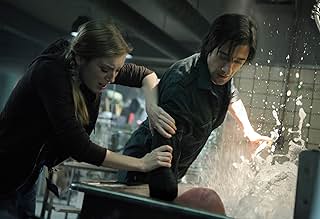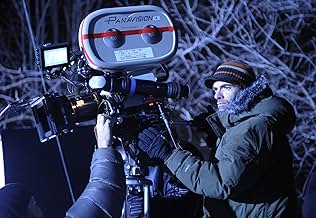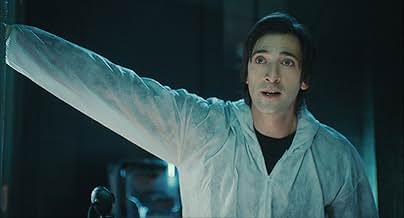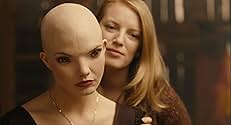Die Genetiker Clive Nicoli und Elsa Kast hoffen, berühmt zu werden mit der erfolgreichen Verschmelzung von DNA verschiedener Tiere zu neuen Hybridtieren für medizinische Zwecke .Die Genetiker Clive Nicoli und Elsa Kast hoffen, berühmt zu werden mit der erfolgreichen Verschmelzung von DNA verschiedener Tiere zu neuen Hybridtieren für medizinische Zwecke .Die Genetiker Clive Nicoli und Elsa Kast hoffen, berühmt zu werden mit der erfolgreichen Verschmelzung von DNA verschiedener Tiere zu neuen Hybridtieren für medizinische Zwecke .
- Auszeichnungen
- 4 Gewinne & 23 Nominierungen insgesamt
Ausgewählte Rezension
"Splice" is a step in the right direction for horror.
Every so often, I find myself pleasantly surprised by intentionally misadvertised entertainment, and writer/director Vincenzo Natali's genetic genre mash-up is the latest such example. From a marketing standpoint, its scare-tactics are clearly the easy sell, despite their comprising only a tiny percentage of its thematic intent. 'Hard sci-fi parenting metaphor' is, after all, a much tougher pitch.
So expecting the tasteless creature feature from the trailer, "Splice" impressed me in its pursuit of a more complex emotional response than fear, and is successful in burrowing into your subconscious and picking at your psyche. It's a thinking man's B picture, which plays with the idea of morality on both a scientific and personal level. That it remains intellectually stimulating, even when the surface-area film dips into more traditionally hokey horror territory, is its greatest strength.
What's so interesting about the story, in spite of what the trailer suggests, is that the creature artificially spawned by genetic engineers Clive and Elsa (Adrian Brody and Sarah Polley) is not an antagonist for the vast majority of the film. "Splice" isn't about a monster— It's about parenthood, and like with "Rosemary's Baby" or "Eraserhead," taking the associated fears and filtering them through a horror lens.
Besides the tail and the pronounced facial cleft, test-tube baby Dren ('Nerd' backwards, heh) is essentially human, and a big part of "Splice's" inherent creepiness is that she's treated in turn as a subject and a child—Warmly received, but caged and abandoned for significant stretches of time. The realization of this character by French actress Delphine Chanéac, is another of the film's triumphs. Her general lack of dialogue sometimes forces the performance to rely a little too heavily on pantomime, but that we can both feel for and fear Dren simultaneously is a testament to the range of the actress.
Perhaps it's because "Splice" nails the big performances and the big ideas, and because the gears turning behind the action are so consistently fluid, that it's all the more apparent when it stumbles over little things, like stilted motivation issues, and superfluous, grating secondary characters. Clive's brother (Brandon McGibbon) and boss (David Hewlett), for example, are flat placeholder roles that transparently progress the plot instead of enriching it. The triangular relationship between Clive, Elsa, and Dren, and its weird morphing emotional permutations, is what "Splice" is at its core. It is a film with very few characters, but every moment not spent on that central dynamic feels like time wasted.
Still, that minor gripe is forgivable because "Splice" has two hugely important and rare qualities for modern horror—Original thought and fearless storytelling. The undercurrent of sexuality in the film, the internal dialogue on gender roles, is apparently one of the reasons no studio wanted to touch the script last year, but Natali's film is a cut above the rest precisely because it isn't afraid to make an audience uncomfortable. And it gets uncomfortable.
"Splice" gets a lot of credit from me in the abstract. The concrete film doesn't quite live up to the incredible promise of the ideas behind it, but the very presence of those ideas is reaffirming to a degree, and that "Splice" received a wide domestic release is more encouraging still. Granted, it went on to perform below expectations at the box office, but was positioned against more breezy summer fare like "Shrek" and "Get Him to the Greek."
The other possibility, and this suggests more consumer confidence than an ad man may be inclined to grant, is that "Splice's" scare-tactics aren't the easy sell. Maybe, like me, potential moviegoers just saw a trailer for another crappy horror movie instead of the interesting, offbeat experiment it is.
It's Warner Brother's loss, and the audience's.
Every so often, I find myself pleasantly surprised by intentionally misadvertised entertainment, and writer/director Vincenzo Natali's genetic genre mash-up is the latest such example. From a marketing standpoint, its scare-tactics are clearly the easy sell, despite their comprising only a tiny percentage of its thematic intent. 'Hard sci-fi parenting metaphor' is, after all, a much tougher pitch.
So expecting the tasteless creature feature from the trailer, "Splice" impressed me in its pursuit of a more complex emotional response than fear, and is successful in burrowing into your subconscious and picking at your psyche. It's a thinking man's B picture, which plays with the idea of morality on both a scientific and personal level. That it remains intellectually stimulating, even when the surface-area film dips into more traditionally hokey horror territory, is its greatest strength.
What's so interesting about the story, in spite of what the trailer suggests, is that the creature artificially spawned by genetic engineers Clive and Elsa (Adrian Brody and Sarah Polley) is not an antagonist for the vast majority of the film. "Splice" isn't about a monster— It's about parenthood, and like with "Rosemary's Baby" or "Eraserhead," taking the associated fears and filtering them through a horror lens.
Besides the tail and the pronounced facial cleft, test-tube baby Dren ('Nerd' backwards, heh) is essentially human, and a big part of "Splice's" inherent creepiness is that she's treated in turn as a subject and a child—Warmly received, but caged and abandoned for significant stretches of time. The realization of this character by French actress Delphine Chanéac, is another of the film's triumphs. Her general lack of dialogue sometimes forces the performance to rely a little too heavily on pantomime, but that we can both feel for and fear Dren simultaneously is a testament to the range of the actress.
Perhaps it's because "Splice" nails the big performances and the big ideas, and because the gears turning behind the action are so consistently fluid, that it's all the more apparent when it stumbles over little things, like stilted motivation issues, and superfluous, grating secondary characters. Clive's brother (Brandon McGibbon) and boss (David Hewlett), for example, are flat placeholder roles that transparently progress the plot instead of enriching it. The triangular relationship between Clive, Elsa, and Dren, and its weird morphing emotional permutations, is what "Splice" is at its core. It is a film with very few characters, but every moment not spent on that central dynamic feels like time wasted.
Still, that minor gripe is forgivable because "Splice" has two hugely important and rare qualities for modern horror—Original thought and fearless storytelling. The undercurrent of sexuality in the film, the internal dialogue on gender roles, is apparently one of the reasons no studio wanted to touch the script last year, but Natali's film is a cut above the rest precisely because it isn't afraid to make an audience uncomfortable. And it gets uncomfortable.
"Splice" gets a lot of credit from me in the abstract. The concrete film doesn't quite live up to the incredible promise of the ideas behind it, but the very presence of those ideas is reaffirming to a degree, and that "Splice" received a wide domestic release is more encouraging still. Granted, it went on to perform below expectations at the box office, but was positioned against more breezy summer fare like "Shrek" and "Get Him to the Greek."
The other possibility, and this suggests more consumer confidence than an ad man may be inclined to grant, is that "Splice's" scare-tactics aren't the easy sell. Maybe, like me, potential moviegoers just saw a trailer for another crappy horror movie instead of the interesting, offbeat experiment it is.
It's Warner Brother's loss, and the audience's.
- colinrgeorge
- 8. Juni 2010
- Permalink
Handlung
WUSSTEST DU SCHON:
- WissenswertesSpecial effects designers Howard Berger and Greg Nicotero developed 11 different versions of Dren for the film.
- PatzerWhen Dren hangs upside down from the rafter in the barn, her dress doesn't fall down around her shoulders.
- Crazy CreditsThe company logos appear on X-rays.
- Alternative VersionenFinnish and German Blu-rays are 108 min. versions. US and UK versions 104 min.
- VerbindungenFeatured in The Rotten Tomatoes Show: The Back-up Plan/The Losers/Paper Man (2010)
Top-Auswahl
Melde dich zum Bewerten an und greife auf die Watchlist für personalisierte Empfehlungen zu.
Details
- Erscheinungsdatum
- Herkunftsländer
- Offizielle Standorte
- Sprachen
- Auch bekannt als
- Splice: experimento mortal
- Drehorte
- Produktionsfirmen
- Weitere beteiligte Unternehmen bei IMDbPro anzeigen
Box Office
- Budget
- 30.000.000 $ (geschätzt)
- Bruttoertrag in den USA und Kanada
- 17.010.170 $
- Eröffnungswochenende in den USA und in Kanada
- 7.385.277 $
- 6. Juni 2010
- Weltweiter Bruttoertrag
- 27.127.620 $
- Laufzeit1 Stunde 44 Minuten
- Farbe
- Sound-Mix
- Seitenverhältnis
- 1.85 : 1
Zu dieser Seite beitragen
Bearbeitung vorschlagen oder fehlenden Inhalt hinzufügen

Oberste Lücke
What is the streaming release date of Splice - Das Genexperiment (2009) in India?
Antwort

















